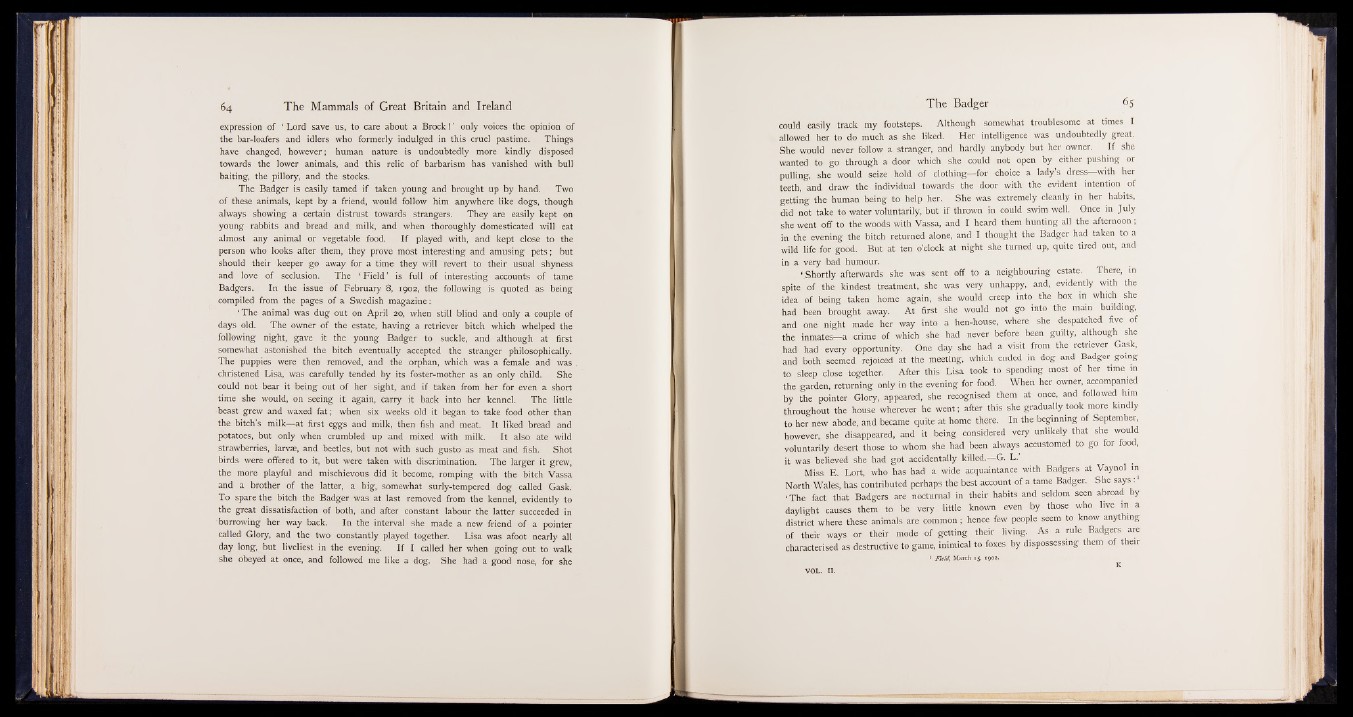
64 The Mammals of Great Britain and Ireland
expression of ‘ Lord save us, to care about a Brock I ’ only voices the opinion of
the bar-loafers and idlers who formerly indulged in this cruel pastime. Things
have changed, however; human nature is undoubtedly more kindly disposed
towards the lower animals, and this relic of barbarism has vanished with bull
baiting, the pillory, and the stocks.
The Badger is easily tamed if taken young and brought up by hand. Two
of these animals, kept by a friend, would follow him anywhere like dogs, though
always showing a certain distrust towards strangers. They are easily kept on
young rabbits and bread and milk, and when thoroughly domesticated will eat
almost any animal or vegetable food. I f played with, and kept close to the
person who looks after them, they prove most interesting and amusing pets; but
should their keeper go away for a time they will revert to their usual shyness
and love of seclusion. The ‘ Field ’ is full of interesting accounts of tame
Badgers. In the issue of February 8, 1902, the following is quoted as being
compiled from the pages of a Swedish magazine:
‘ The animal was dug out on April 20, when still blind and only a couple of
days old. The owner of the estate, having a retriever bitch which whelped the
following night, gave it the young Badger to suckle, and although at first
somewhat astonished the bitch eventually accepted the stranger philosophically.
The puppies were then removed, and the orphan, which was a female and was .
christened Lisa, was carefully tended by its foster-mother as an only child. She
could not bear it being out of her sight, and if taken from her for even a short
time she would, on seeing it again, carry it back into her kennel. The little
beast grew and waxed fat; when six weeks old it began to take food other than
the bitch’s milk—at first eggs and milk, then fish and meat. It liked bread and
potatoes, but only when crumbled up and mixed with milk. It also ate wild
strawberries, larvae, and beetles, but not with such gusto as meat and fish. Shot
birds were offered to it, but were taken with discrimination. The larger it grew,
the more playful and mischievous did it become, romping with the bitch Vassa
and a brother of the latter, a big, somewhat surly-tempered dog called Gask.
To spare the bitch the Badger was at last removed from the kennel, evidently to
the great dissatisfaction of both, and after constant labour the latter succeeded in
burrowing her way back. In the interval she made a new friend of a pointer
called Glory, and the two constantly played together. Lisa was afoot nearly all
day long, but liveliest in the evening. I f I called her when going out to walk
she obeyed at once, and followed me like a dog. She had a good nose, for she
The Badger 65
could easily track my footsteps. Although somewhat troublesome at times I
allowed her to do much as she liked. Her intelligence was undoubtedly great.
She would never follow a stranger, and hardly anybody but her owner. I f she
wanted to go through a door which she could not open by either pushing or
pulling, she would seize hold of clothing—for choice a lady’s dress—with her
teeth, and draw the individual towards the door with the evident intention of
getting the human being to help her. She was extremely cleanly in her habits,
did not take to water voluntarily, but if thrown in could swim well. Once in July
she went off to the woods with Vassa, and I heard them hunting all the afternoon;
in the evening the bitch returned alone, and I thought the Badger had taken to a
wild life for good. But at ten o’clock at night she turned up, quite tired out, and
in a very bad humour.
'.Shortly afterwards she was sent off to a neighbouring estate. There, in
spite of the kindest treatment, she was very unhappy, and, evidently with the
idea of being taken home again, she would creep into the box in which she
had been brought away. At first she would not go into the main building,
and one night made her way into a hen-house, where she despatched five of
the inmates-a crime of which she had never before been guilty, although she
had had every opportunity. One day she had a visit from the retriever Gask,
and both seemed rejoiced at the meeting, which ended in dog and Badger going
to sleep close together. After this Lisa took to spending most of her time in
the garden, returning only in the evening for food. When her owner, accompanied
by the pointer Glory, appeared, she recognised them at once, and followed him
throughout the house wherever he went; after this she gradually took more kindly
to her new abode, and became quite at home there. In the beginning of September,
however, she disappeared, and it being considered very unlikely that she would
voluntarily desert those to whom she had been always accustomed to go for food,
it was believed she had got accidentally killed.—G. L.'
Miss E . Lort, who has had a wide acquaintance with Badgers at Vaynol in
North Wales, has contributed perhaps the best account of a tame Badger. She sa y s : 1
'The fact that Badgers are nocturnal in their habits and seldom seen abroad by
daylight causes them to be very little known even by those who live in a
district where these animals are common ; hence few people seem to know anything
of their ways or their mode of getting their living. As a rule Badgers are
characterised as destructive to game, inimical to foxes by dispossessing them of their